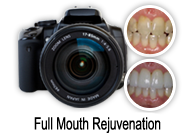Worn Teeth and Wrinkles: Your Guide and FAQ
When teeth become worn down so much so that there is no longer enough of the crown left to function properly or support oral structure, it often results in the loss of teeth and, consequently, the loss of facial support. Dr. David Peck has observed this phenomenon in many of our patients in Springfield, Massachusetts, wherein worn teeth gradually give way to wrinkles because the inevitable tooth loss causes the cheeks to collapse or become sunken in and form wrinkle lines at the corners of the mouth.
What Is the Relationship Between Worn Teeth and Wrinkles?
Most people may not know it, but the teeth function more than just to bite, chew, or flash brilliantly with every smile. They also serve as supporting structures for the lips and the cheeks by making them firm and fuller. They also facilitate your ability to talk and pronounce various sounds properly. More importantly, they preserve and retain the height of the alveolar ridge and also maintain your vertical dimension of occlusion.
A full set of teeth maintains the distance between the upper maxillary and lower mandibular regions of the mouth. When worn-out teeth are lost, and there aren’t a sufficient number of teeth in the mouth to maintain the natural vertical dimension of occlusion, there is a tendency for the mouth to overclose. In addition, your front teeth serve to provide the lips with an ample supporting structure to prop them up, keep them toned, and maintain their shape and form. As you age and get worn teeth that eventually fall out, your cheeks will begin to sag so that wrinkle lines will appear at the corners of your mouth, your lips lose their muscle tone, and wrinkles will begin to form on their outer edges.
Is There a Way to Resolve Worn Teeth and Wrinkles?
To be able to manage the effects of worn teeth and the appearance of wrinkles, dentists often recommend tooth contouring and reshaping to correct minor imperfections in the teeth as they arise, simply by touching up the edges and sharpening the angles of the teeth to make them appear more symmetrical. Porcelain veneers and dental crowns can also be used to restore or augment the tooth’s original structure. Concealing gaps, chips, and stains on teeth by using dental bonds or sculpting with a tooth-colored resin can dramatically change the appearance of the teeth to make them more attractive and maintain their structure to keep them from wearing down.
Common Questions About Teeth and Their Relationship to Wrinkles
Many people don’t associate missing teeth with the formation of wrinkles, and when they find out they can be the cause of some wrinkles, there are often many questions. Here are some of the most common questions that we get and their answers:
Can Missing Teeth Cause Wrinkles?
Yes, missing teeth can contribute to facial wrinkles. When teeth are lost, it can lead to changes in facial structure, such as a reduction in jawbone density. This loss of support may result in sagging skin, leading to the formation of wrinkles around the mouth and cheeks.
Why Do My Gums Look Wrinkled?
Wrinkled or receding gums can be a sign of gum disease, which is often caused by poor oral hygiene. Gum recession exposes the roots of the teeth, making the gums appear wrinkled. Additionally, the loss of gum tissue can affect the overall aesthetics of the smile.
Does Chewing Gum Cause Wrinkles?
Chewing gum itself isn’t a cause of wrinkles. However, excessive gum chewing can contribute to the development of fine lines around the mouth, commonly referred to as “smoker lines.” This is because repetitive facial movements, like chewing gum, can contribute to the breakdown of collagen and elastin in the skin over time.
Do You Get Mouth Wrinkles From Dentures?
Dentures themselves may not directly cause mouth wrinkles. However, improper fitting or poorly maintained dentures can lead to changes in the facial structure over time, potentially contributing to the appearance of wrinkles. It’s crucial to ensure that dentures fit well and to maintain good oral hygiene to prevent any negative effects on facial aesthetics.
Why Are My Bottom Front Teeth Worn Down?
Worn-down bottom teeth can be attributed to various factors, including teeth grinding (bruxism), misaligned teeth, or a poor bite (malocclusion). Bruxism, especially during sleep, can lead to significant wear on the teeth. It’s advisable to consult with a dentist to identify the underlying cause and determine an appropriate treatment plan to prevent further damage.
Are Smile Lines Caused by Dental Issues?
Smile lines, or nasolabial folds, are primarily associated with aging, sun exposure, and the natural loss of skin elasticity. While dental issues themselves may not directly cause smile lines, the overall health of your teeth and gums can influence facial aesthetics. Missing teeth, gum recession, or changes in bite alignment may indirectly impact facial appearance, emphasizing the importance of maintaining good oral health for overall well-being.
How to Prevent Worn Teeth
Practice Good Oral Hygiene
Practicing good oral hygiene is the foundation of preventing worn teeth. Regular brushing, flossing, and rinsing with a fluoride mouthwash help remove plaque and bacteria that can contribute to tooth erosion. Brush your teeth at least twice a day, using a soft-bristled toothbrush and fluoride toothpaste to protect your enamel. Don’t forget to replace your toothbrush every three to four months or sooner if the bristles are frayed.
Address Teeth Grinding
Teeth grinding (bruxism) is a common cause of worn teeth. Many people grind their teeth involuntarily, often during sleep. If you suspect you have bruxism, consult with a dentist. They may recommend a custom-fitted nightguard to wear while sleeping, creating a barrier between your upper and lower teeth.
Are Your Wrinkles Caused by Worn Teeth?
If you have concerns about your dental health or facial aesthetics, it’s recommended that you schedule a consultation with a dentist or healthcare professional such as Dr. Peck at Taylor Street Dental. We can assess your specific situation and provide personalized advice and treatment options. Call 413-781-7645 to schedule your visit.




